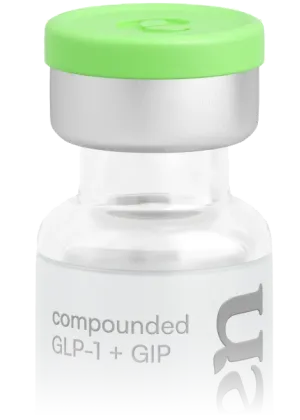Tirzepatide Dosing Chart: FDA Schedule and Compounded Differences
See how tirzepatide dosing works with FDA-approved schedules and how compounded versions may differ. Get a clear chart and learn what matters for safe use.
- Tirzepatide dosing chart (FDA-approved schedule): Start at 2.5 mg weekly for 4 weeks, then increase by 2.5 mg every ~4 weeks to a usual maintenance range of 5–15 mg, with a maximum of 15 mg weekly.
- Efficacy (trials): In clinical studies of FDA-approved tirzepatide combined with lifestyle support, participants achieved up to ~20% body-weight reduction at 72 weeks. Individual results vary.
- Tolerability: In trials, gastrointestinal side effects (nausea, diarrhea, vomiting) were most common during dose escalations and often decreased over time; not all patients experience resolution.
- Compounded products: Not FDA-approved; concentration, devices, and dosing schedules may differ from labeled medications and lack large-scale clinical trial data.
- Work with a clinician: Decisions about dosing, titration pace, and ongoing use should be made with a licensed healthcare provider.
Disclaimer: Compounded GLP-1 therapies are prepared only when a licensed prescriber determines a clinically significant difference for an identified patient. These medications are not reviewed or approved by the FDA for safety, efficacy, or quality. Please consult a licensed healthcare provider to determine whether GLP-1 medications are medically appropriate for you. Eden coordinates care; licensed providers evaluate and prescribe; partner pharmacies dispense and label. Eden does not guarantee outcomes. This content is for informational purposes only and does not constitute medical advice.
Tirzepatide was approved by the FDA to treat type 2 diabetes in 2022 under the brand name Mounjaro® and for chronic weight management in 2023 as Zepbound®. Compared to some semaglutide brand names, like Ozempic®, Wegovy®, or Rybelsus®, tirzepatide is a relative newcomer in this fast-moving industry.*
Tirzepatide works by combining the actions of two hormones involved in glucose regulation: glucagon-like peptide-1 and glucose-dependent insulinotropic polypeptide (GIP). By activating both GLP-1 and GIP receptors, tirzepatide helps lower blood sugar levels through multiple pathways, including increasing insulin secretion, reducing glucagon secretion from the pancreas, slowing gastric emptying, and increasing feelings of fullness.
This article explains the standard FDA-approved titration (starting at 2.5 mg with ~4-week step-ups to 5–15 mg), when GI side effects most often occur during escalation, and practical considerations for staying on track. It also clarifies how compounded versions may differ in concentration, devices, and schedules, and that compounded medications are not FDA-approved and may be prescribed only when a licensed prescriber determines a clinically significant difference for a patient.
*Mounjaro® and Zepbound® are registered trademarks of Eli Lilly and Company; Ozempic®, Wegovy®, and Rybelsus® are registered trademarks of Novo Nordisk A/S. No affiliation or endorsement is claimed.
FDA Use & Compounding Considerations
In clinical trials of FDA-approved tirzepatide, some participants achieved significant body-weight reduction at higher doses (10-15 mg doses) in combination with diet and lifestyle changes. Individual results may vary. The FDA-approved injectable medication is marketed as Mounjaro® for type 2 diabetes and Zepbound® for chronic weight management in certain patient groups.
Understanding how FDA-approved tirzepatide is typically dosed may help patients have informed conversations with their healthcare provider. Per FDA-approved labeling, the starting dose is 2.5 mg once weekly for 4 weeks before considering gradual increases.
Important note on compounded tirzepatide:
Compounded medications are not FDA-approved. Their concentration, devices, and dosing schedules may differ from FDA-approved medications, and they lack large-scale clinical trial data. Compounded medications may be prescribed only when a licensed provider determines they are clinically appropriate and produce a significant difference for an identified patient, which may include alternate strengths or dosage forms.
What is Titration?
In medical terms, titration refers to the process of adjusting the dosage of a medication based on an individual’s response to treatment. This involves starting with a low dose and gradually increasing it until the desired therapeutic effect is achieved while minimizing the side effects. Titration is common in the management of conditions such as diabetes, hypertension, and psychiatric disorders, where finding the optimal dosage is crucial for effective treatment.
Per the FDA-approved labeling for tirzepatide, dose titration is used to improve tolerability by allowing the body time to adjust. Starting with a lower dose also allows healthcare providers to assess response and safety. A licensed healthcare provider may increase the dose ~every 4 weeks, as tolerated, with typical maintenance doses between 5 mg and 15 mg once weekly (maximum 15 mg once weekly).
{{primary-cta}}
Tirzepatide Dosing at a Glance
The FDA-approved tirzepatide dosing schedule follows this pattern:
Per FDA labeling for both Mounjaro® (type 2 diabetes) and Zepbound® (weight management), initiation is 2.5 mg once weekly for 4 weeks. The 2.5 mg starting dose is not intended for long-term glycemic control or weight management. Dose may be increased in 2.5 mg steps after at least 4 weeks at a given dose, as tolerated.
Tirzepatide may be administered at any time of day, with or without meals. If a dose is missed, administer within 4 days (96 hours); otherwise, skip it and resume the regular schedule.
FDA-Approved Tirzepatide Dosage Chart Explained
FDA-approved labeling establishes specific protocols for tirzepatide administration that balance effectiveness with your body's ability to tolerate the medication. The medication comes in six different strengths: 2.5mg, 5mg, 7.5mg, 10mg, 12.5mg, and 15mg per 0.5mL.
You'll receive tirzepatide through subcutaneous injection in your abdomen, thigh, or upper arm. For both Mounjaro® and Zepbound®, you can change the day of your weekly injection if needed, as long as there are at least 3 days (72 hours) between doses. This flexibility can help you maintain a regular schedule.
Both medications start the same way, but their long-term dosing differs depending on your treatment goals:
- Mounjaro® (diabetes): After your initial 5mg dose, increases depend on how well your blood sugar is controlled
- Zepbound® (weight loss): Your maintenance dose may settle at 5mg, 10mg, or 15mg weekly
- Zepbound® (sleep apnea): Per FDA-approved labeling, target maintenance doses are 10mg or 15mg weekly
Your doctor will carefully monitor how you respond to each dose change and may pause, slow, or stop escalation based on response and side effects. Some patients stay at lower maintenance doses instead of progressing to the maximum.
{{primary-cta}}
Compounded Tirzepatide Dosage: What's Different?
Compounded tirzepatide differs from FDA-approved Mounjaro® and Zepbound® in several important ways. Specialized pharmacies create compounded versions rather than pharmaceutical manufacturing facilities. This difference affects both how the medication is made and how doctors prescribe it.
Compounded formulations may not follow the standard tirzepatide dosing chart used with FDA-approved versions. These variations happen because compounded medications aren't subject to the same FDA oversight that governs commercial products.
Compounded tirzepatide dosage might differ in these ways:
- Concentration levels may vary between pharmacies
- Starting doses might not follow the standard 2.5mg protocol
- Dose increases could happen more quickly or slowly
- Maximum recommended doses might not match FDA guidelines
- Injection methods and devices could be different
- Compounded formulations from healthcare providers may contain additives to achieve a particular health objective for the patient
You need to understand these differences if your physician is recommending a compounded medication containing tirzepatide. Compounded medications lack the extensive clinical trial data that supports FDA-approved products. Your doctor will likely monitor you more closely as a result.
When prescribed, compounded tirzepatide may be used in patient-specific dosing schedules according to individualized prescriptions, when clinically appropriate. These variations depend on individual circumstances and the compounding pharmacy.
Side Effects, Safety, and Best Practices
Important safety information: Mounjaro® and Zepbound® carry a boxed warning for risk of thyroid C-cell tumors and is contraindicated in patients with a personal or family history of medullary thyroid carcinoma (MTC) or Multiple Endocrine Neoplasia syndrome type 2 (MEN2).
Safety matters when you're following your tirzepatide dosing schedule. Most GI side effects happen during dose increases, with nausea affecting 20-33% of patients, diarrhea 18-23%, and vomiting 5-12%. In trials, these events were most frequent during dose escalation and often decreased over time; not all patients experience resolution.
Proper storage keeps your medication effective. Unopened pens need refrigeration between 2°C-8°C. Once you start using a pen, you can keep it at room temperature up to 30°C for no more than 21 days. Never freeze tirzepatide; frozen medication must be discarded.
Follow these steps for safe injections:
- Rotate between your abdomen, thigh, or upper arm each week
- Clean the injection area with an alcohol swab
- Skip areas that are bruised, scarred, or irritated
- Use a sharps container for used needles
Managing side effects becomes easier with simple changes:
- Eat smaller, more frequent meals
- Avoid greasy or spicy foods
- Stay well-hydrated
Some symptoms require immediate medical attention. Per the FDA-approved Medication Guides, patients are advised to contact a healthcare provider immediately for severe abdominal pain (possible pancreatitis), symptoms of a serious allergic reaction, or signs of gallbladder problems, and to report thyroid-related symptoms such as a neck lump, hoarseness, trouble swallowing, or shortness of breath.
Proper storage, injection techniques, and following your dosing schedule help ensure both safety and effectiveness during treatment.
Conclusion
We’ve covered the dosing schedules for FDA-approved medications containing tirzepatide and how compounded alternatives may differ. Following the proper dosing chart from your healthcare provider is essential for achieving the best results while avoiding unnecessary side effects. The gradual escalation approach, starting with lower doses weekly, helps your body adapt before reaching therapeutic levels, which may reduce the GI problems that often occur when starting treatment.
FDA-approved options differ significantly from compounded versions when it comes to standardization, oversight, and established protocols. Compounded tirzepatide may offer customization benefits for some patients, but it lacks the extensive clinical data that support Mounjaro® and Zepbound®. You should discuss these considerations thoroughly with your healthcare provider before making treatment decisions.
Proper administration techniques, storage requirements, and side effect management strategies are just as important as following the dosing schedule. In FDA-approved clinical trials, approximately 20% body-weight reduction was observed at maximum dosages, which has drawn attention to tirzepatide for both diabetes management and weight reduction.
Whether you're using Mounjaro® for type 2 diabetes or Zepbound® for weight management, four-week intervals between dose increases were used in clinical trials to reduce side effects and improve tolerability. Tirzepatide is a powerful medication that requires careful adherence to established dosing protocols for both safety and effectiveness. Work closely with your healthcare provider and follow these guidelines to help support benefits while managing your treatment successfully.
{{primary-cta}}
Disclaimer: The FDA does not approve compounded medications for safety, quality, or manufacturing. Prescriptions and a medical evaluation are required for certain products. The information provided on this blog is for general informational purposes only. It is not intended as a substitute for professional advice from a qualified healthcare professional and should not be relied upon as personal health advice. The information contained in this blog is not meant to diagnose, treat, cure, or prevent any disease. Readers are advised to consult with a qualified healthcare professional for any medical concerns, including side effects. Use of this blog's information is at your own risk. The blog owner is not responsible for any adverse effects or consequences resulting from the use of any suggestions or information provided in this blog.
Eden is not a medical provider. Eden connects individuals with independent licensed healthcare providers who independently evaluate each patient to determine whether a prescription treatment program is appropriate. All prescriptions are written at the sole discretion of the licensed provider. Medications are filled by state-licensed pharmacies. Please consult a licensed healthcare provider before making any medical decisions.
Frequently asked questions
Blog Components




References
Eli Lilly and Company. (n.d.). Medication Guide ZEPBOUND (tirzepatide) injection, for subcutaneous use. https://pi.lilly.com/us/zepbound-us-mg.pdf
Eli Lilly and Company. (2022). HIGHLIGHTS OF PRESCRIBING INFORMATION. https://www.accessdata.fda.gov/drugsatfda_docs/label/2022/215866s000lbl.pdf
Eli Lilly and Company. (2025). ZEPBOUND. https://www.accessdata.fda.gov/drugsatfda_docs/label/2025/217806Orig1s020lbl.pdf
Farzam, K., & Patel, P. (2024, February 20). Tirzepatide. StatPearls - NCBI Bookshelf. https://www.ncbi.nlm.nih.gov/books/NBK585056/
Jastreboff, A. M., Aronne, L. J., Ahmad, N. N., Wharton, S., Connery, L., Alves, B., Kiyosue, A., Zhang, S., Liu, B., Bunck, M. C., & Stefanski, A. (2022). Tirzepatide once weekly for the treatment of obesity. New England Journal of Medicine, 387(3), 205–216. https://doi.org/10.1056/nejmoa2206038
Novo Nordisk Inc. (2017a). Highlights of prescribing information. https://www.novo-pi.com/wegovy.pdf
Novo Nordisk Inc. (2017b). OZEMPIC. https://www.novo-pi.com/ozempic.pdf
Once weekly Mounjaro® (Tirzepatide) injection. (2025, July). Retrieved September 19, 2025, from https://mounjaro.lilly.com/
Once weekly Zepbound (TM) (tirzepatide) injection. (2025, July). https://zepbound.lilly.com/
Tirzepatide injection. (2025, August 29). Cleveland Clinic. https://my.clevelandclinic.org/health/drugs/23789-tirzepatide-injection
Tirzepatide injection: MedlinePlus Drug Information. (n.d.). https://medlineplus.gov/druginfo/meds/a622044.html
Tirzepatide (subcutaneous route). (2025, July 1). Mayo Clinic. https://www.mayoclinic.org/drugs-supplements/tirzepatide-subcutaneous-route/description/drg-20534045
What is the dosing of Zepbound® (tirzepatide) in patients with moderate to severe obstructive sleep apnea and obesity?. (n.d.). https://medical.lilly.com/us/products/answers/what-is-the-dosing-of-zepbound-tirzepatide-in-patients-with-moderate-to-severe-obstructive-sleep-apnea-and-obesity-265846
The wellness insight you need, without the noise.

















.webp)

